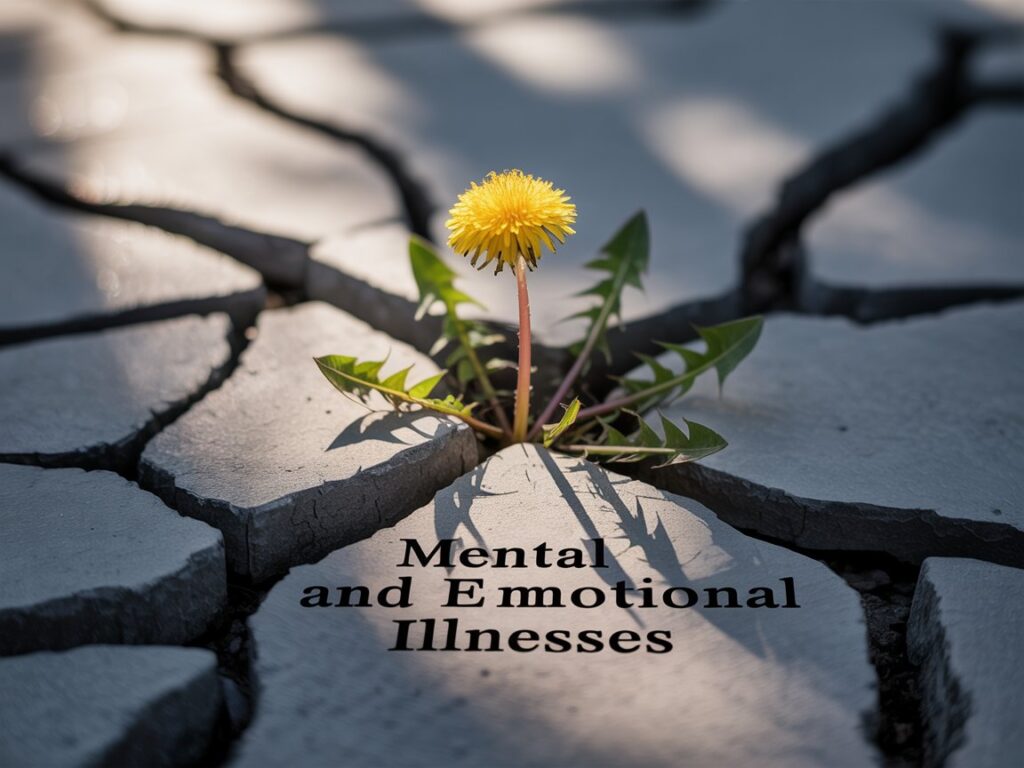Mental and Emotional Illnesses in Social Circles
Imagine being in a room full of humans and, however, feeling absolutely alone. This is a reality for those who are afflicted by Mental and Emotional Illnesses, educated and emotional ailments. These situations don’t simply affect how we experience internally—they reshape how we connect, communicate, and behave in our social world.
While Mental and Emotional Illnesses regularly show up invisibly, their effect on social fitness may be profound. From withdrawal and strained relationships to stigma and isolation, the consequences ripple outward, once in a while, in subtle, regularly devastating ways.
Understanding the Connection Between Mental and Emotional Illnesses and Social Health
Mental ailments inclusive of despair, tension disorders, PTSD, and bipolar disease at once have an effect on how people understand themselves and the arena around them. Emotional ailments, which regularly stem from unresolved trauma, grief, or persistent stress, accentuate this inner disruption. Together, those situations distort emotional regulation, communication, and trust—center factors of social fitness.
What Is Social Health?

Social fitness refers back to the potential to shape pleasant interpersonal relationships and adapt with no trouble to special social situations. When that is compromised through mental struggles, each interaction—be it informal communication or a deep connection—can be like mountain climbing a mountain.
The Social Fallout of Mental and Emotional Illnesses
Sophia’s Story: The Isolation of Anxiety
Sophia, a 29-year-vintage picture designer, as soon as thrived in organizational settings. But after growing social tension, she began fending off even easy social interactions like crew lunches or answering smartphone calls. “It wasn`t that I didn`t need to be with humans—I simply felt like I couldn`t. My coronary heart could race, and my fingers could sweat. I felt defective.”
Her friendships dwindled. Her isolation grew. It wasn’t till a chum constantly checked in that Sophia sought remedy and started out on her street to recovery.
Marcus`s Journey: Depression and Disconnection
For Marcus, despair intended a steady cloud striking over his interactions. “I felt like a burden, so I stopped achieving out,” he says. Despite being surrounded by loving friends, he couldn`t shake the feeling of unworthiness.
Their memories reflect the reviews of millions. According to the World Health Organization, over 280 million humans globally are afflicted by despair alone, with many reporting a pointy decline in their social lives.
Key Ways Mental and Emotional Illnesses Affect Social Health
1. Withdrawal and Avoidance Behaviors
People suffering from emotional ailments frequently withdraw from social settings, now no longer out of apathy but self-preservation. Fear of judgment or being misunderstood ends in:
- Avoiding invitations
- Delayed responses to messages
- Canceling plans last-minute
This self-isolation, even as it imparts a short-term period of relief, frequently ends in more profound loneliness and worsened symptoms.
2. Impaired Communication
Depression and tension have an effect on cognitive processing and emotional regulation, making conversation challenging:
- Struggling to articulate feelings
- Misinterpreting social cues
- Overreacting or shutting down emotionally
Such styles can stress relationships, inflicting frustration or misjudgment on others.
3. Stigma and Self-Stigma
Even in today`s extra-knowledgeable society, the stigma around intellectual fitness persists. This contributes to a cycle of silence, shame, and deteriorating social bonds.
Self-stigma—in which people internalize terrible stereotypes—similarly damages self-belief and social engagement.
4. Dependency or Codependent Relationships
Some people may also grow to be overly dependent on one or humans for emotional support due to codependent dynamics. This frequently places undue strain on one’s relationships and bounds broader social growth.
The Emotional Causes of Illness: A Deeper Look
The frame and thoughts are intricately connected. Emotional stressors frequently take place physically, influencing the whole lot, from digestion to coronary heart fitness. In fact, many researchers are exploring the emotional reasons for contamination, listing to hint how trauma or continual emotional stress can result in bodily ailments.
Can Emotional Trauma Cause Thyroid Problems?
New studies suggest that emotional trauma can mess up the hypothalamic-pituitary-adrenal (HPA) axis, which could affect how the thyroid works. Chronic strain or unresolved trauma would possibly make a contribution to autoimmune thyroid sicknesses like Hashimoto`s.
Can Emotional Trauma Cause Brain Damage?

Studies have proven that extended publicity to emotional trauma—mainly at some point in early developmental years—can result in structural and functional mind modifications, such as inside the amygdala and hippocampus. These modifications have an effect on emotional regulation, memory, and social cognition.
Understanding those hyperlinks highlights the urgency of addressing emotional fitness—now no longer only for mental well-being but for holistic, social well-being.
From Isolation to Integration: Restoring Social Health
1. Therapeutic Interventions
Psychotherapy (CBT, DBT, EMDR) has demonstrated power in treating emotional and intellectual ailments. Therapy doesn`t simply lessen symptoms; it enables people to construct more healthy dating competencies and improve self-awareness.
2. Peer Support Networks
Groups like NAMI (National Alliance on Mental Illness) and online groups offer secure areas to proportion experiences, lessen stigma, and rebuild social self-belief.
3. Mindfulness and Emotional Intelligence Training
Programs that foster emotional regulation, like mindfulness or emotional intelligence coaching, empower people to manipulate strain, enhance empathy, and talk extra effectively.
4. Reframing Relationships
Learning to talk about one`s wishes openly—without guilt or shame—can rework relationships from strain factors into assets of healing. It begins offevolved with:
- Setting boundaries
- Practicing vulnerability
- Choosing supportive, non-judgmental humans
5. Building a Social Safety Net
Reintegration right into supportive social surroundings takes time. However, a steady attempt will pay off. Joining clubs, volunteering, or ordinary walks in network areas can start to rebuild fractured connections. Sometimes, those small acts grow to be the muse of a more fit social life.
6. Family and Caregiver Education
Educating the ones closest to a person tormented by intellectual and emotional ailments is crucial. When their own circle of relatives and buddies apprehend the emotional reasons for illness, they grow to be allies in preference to unwitting stressors. Simple consciousness schooling can save you from miscommunications and inspire empathy.
Table: Quick Snapshot – Effects of Mental and Emotional Illnesses on Social Health
| Area Affected | Mental Illness Impact | Emotional Illness Impact |
| Communication | Withdrawn, incoherent | Overreactive, avoidant |
| Trust & Intimacy | Struggles with closeness | Fear of betrayal or abandonment |
| Social Engagement | Isolation, avoidance | Feeling misunderstood or unsafe |
| Physical Health | Sleep, energy, immunity drop | Psychosomatic symptoms, fatigue |
| Sense of Belonging | Alienation | Deep-rooted insecurity |
| Personal Identity | Fragmented self-perception | Guilt, shame, confusion |
Final Thoughts: Healing Is a Social Act
Mental and emotional ailments don`t simply have an effect on the person—they have an impact on each interaction, relationship, and connection. But here`s the silver lining: simply as those ailments can fray the threads of social fitness, intentional healing—through therapy, connection, and compassion—can mend them.
When we apprehend that social fitness isn’t always a luxurious but a crucial part of human wellbeing, we shift from surviving to simply thriving.
Society additionally has a function to play. Public discourse, available intellectual fitness care, and inclusive network systems can act as adequate buffers. Together, we will reframe emotional vulnerability now no longer as a weakness but as an electricity that connects us all.
Have you or a person you realize skilled social effects from intellectual or emotional illness? Share your tale or mind inside the remarks below. For greater content material like this, recollect subscribing to our e-newsletter or exploring our intellectual wellbeing resources. Visit our website for trusted health information and expert guidance.




